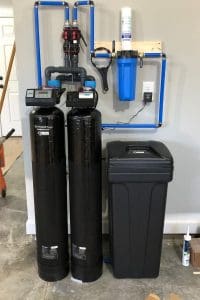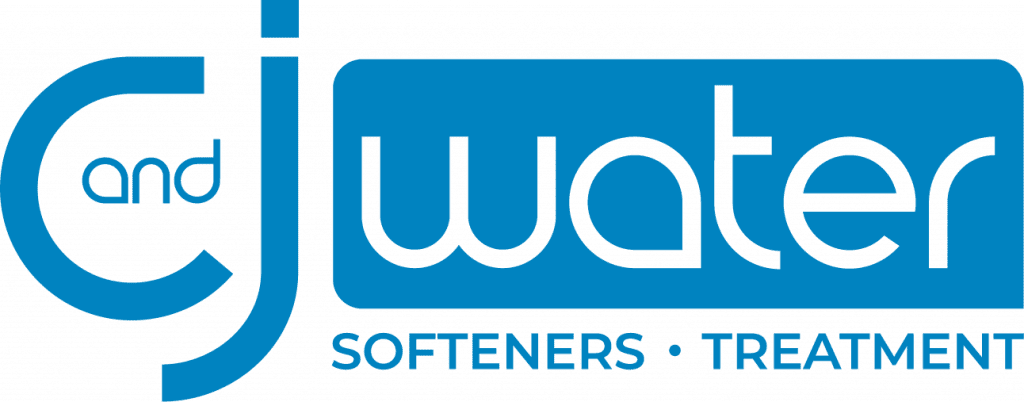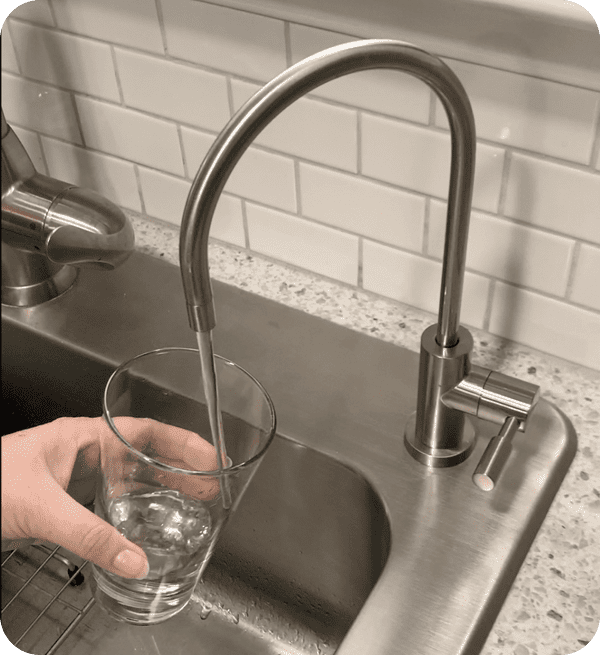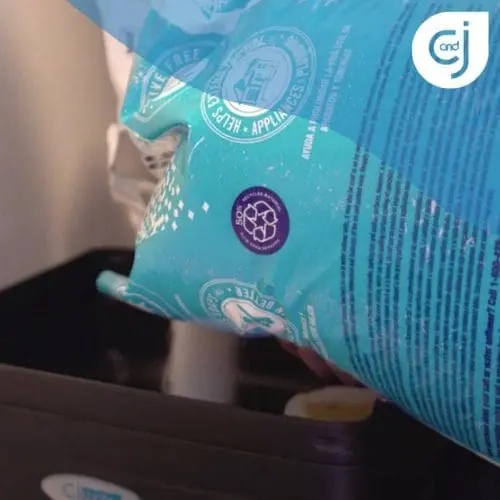Which is Better, Salt Based Water Softeners or Salt-Free Water Softeners?
At C and J Water we are often asked, “What is the difference between a salt-free and salt-based water softener?” In many cases, people are led to believe both types of softeners work the same, and the only difference is that one doesn’t use salt. This really isn’t the truth—here’s the scoop:
Salt-Based Water Softeners

Let’s take a look at how this system works. Water Softening by definition is REMOVING Calcium (Ca2+) and Magnesium (Mg2+) from the water through a process called ion exchange using a polymer resin bed which gives off a sodium particle in exchange for hardness minerals.
A water test would show this type of result—before treatment 10 grains/gallon, results after treatment 0 grains/gallon. The system works great, especially in Central Indiana where water is very hard.
Salt-based water softeners use an electronic metered valve mounted atop a fiberglass resin tank that meters water by the gallon and then runs a cleaning cycle when the ion resin bed reaches a saturation point.
During the cleaning cycle, the electronic valve cycles a series of back flushes to purge the hardness particulates that have been captured from the system and flush them down a drain line. The sodium is also replenished in the resin bed during the cycle and all is ready to go again.
Water Softeners will give you more of the “slick” feeling of the water in the shower and you will notice the soap creating more bubbles. The reason and what many water experts will tell you is “this is the feeling of being clean.” This is due to the minerals being taken from the water and no longer being present to dry your skin. Other benefits you’ll see include keeping brighter colors in your clothes with the abrasive minerals no longer present.
Is your skin feeling dry? Are you getting scale build-up on shower doors/glassware? Are your clothes dingy? Do you want to use less soap? A saltwater softener would be your better choice.
Salt-Free Water Softeners
In the salt-based process, above (true water softening), hardness minerals are actually removed from the water. In the salt-free process, minerals are retained in the water, but their form is changed so they will not adhere to surfaces. “Salt-free” water softeners are actually not softeners, they are “water conditioners”.
Despite having “water softener” right in the name, salt-free water softeners aren’t actually water softeners and don’t give you soft water. They’re actually just water conditioners, and they do nothing to reduce water hardness. Water hardness results from excess mineral content in the water, like calcium and magnesium. A salt-based water softener removes those minerals, thus lowering the hardness and creating softer water. On the other hand, a salt-free system works by crystallizing calcium, but not removing it.
Water is processed through catalytic media using a physical process called Template Assisted Crystallization (TAC). What happens is the hardness minerals are converted to a hardness crystal that is not able to bind to surfaces. This is actually water conditioning, not softening. A water test would show this result: before treatment 10 grains/gallon, result post/treatment 10 grains/gallon. Again, the hardness is still there… just changed so it won’t adhere to surfaces.
There is no electrical valve needed on a salt-free system because the system works as a conditioner and never captures anything, therefore, eliminating the need to purge any minerals. Salt-Free Water Conditioners create hardness crystals but leave minerals present in the water. The crystals won’t adhere to surfaces so you will only see a reduction in scale build-up, not an elimination. Homeowners should not be expecting the same results as salt-based technology.
Since a salt-free system crystallizes the calcium in your water, the calcium won’t be able to adhere to the insides of your pipes. That reduces scale buildup in your plumbing, which is the only benefit that a salt-free system offers. This falls far short of the many benefits of a real water softener. Salt-based systems will outperform salt-free for overall water softening. The best way to soften water is with a salt-based softener.
Which System Is Right for Your Family?
Saltless water softeners claim to deliver the same results without the size and hassle of salt-based systems. These salt-free setups promise no more large salt tank taking up room, no more spending money on salt bags, and no more back pain from hauling them home to refill the system. Sounds great, right?
The truth is that salt-free water softeners aren’t water softeners, don’t provide many of the same benefits that salt-based systems do, and aren’t certified to meet industry standards. The choice is clear—only a salt-based water softener is proven to provide softer water, healthier skin, and no scale buildup or soap scum. A salt-based system is a better investment.
We at C and J Water have been installing and servicing water softeners in Central Indiana for over a decade, and have the hands-on experience necessary to give you the system you deserve.
The best way to tell what equipment your home needs is to have a free water analysis done, and C and J Water can help you with that!




